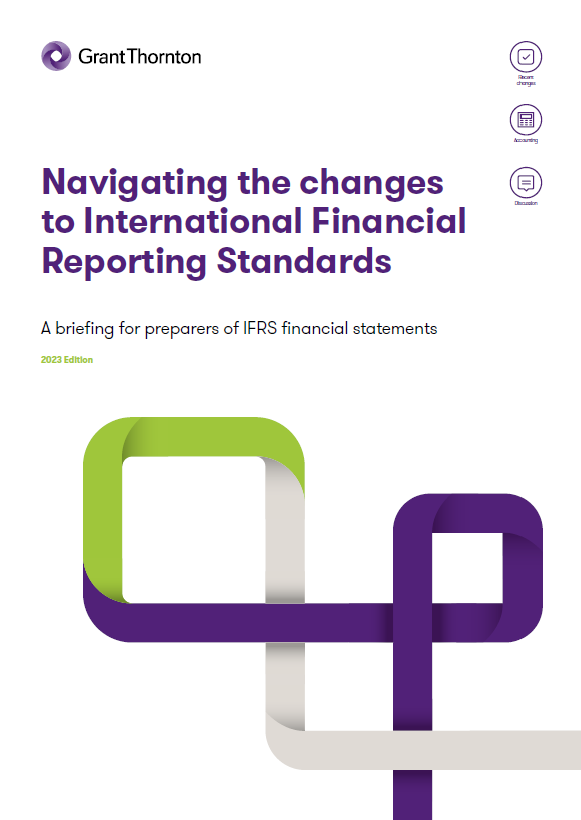-
Audit methodology
At Grant Thornton, we use a single audit methodology across our global network. This means that our clients gain the same proven, high-quality approach wherever they are.

-
Financial statements and consolidated financial statements
Preparation of monthly, quarterly or annual report and consolidated report on the basis of information presented by the client.
-
Financial Accounting
Effective bookkeeping and financial accounting are essential to the success of forward-thinking organisations. To get the optimum benefit from this part of your business, you'll need an experienced team behind you.
-
Tax compliance
Tax is likely to have an impact on almost every business decision you make. Whatever your business’s specific needs, we respond quickly and devise solutions tailored to you. We perform VAT, income tax, social tax and other tax accounting as well as present tax declarations to the tax authorities.
-
Chief financial officer service
Chief Financial Officer services include the periodic reporting, information systems standardization, internal document management and information flow optimization, budget preparation, cost accounting, cash flow and working capital management, financial analysis, investment return evaluation for managers.

-
International taxation
Grant Thornton operations in the Baltic States give us an access to the international expertise and allow advising the client on the minimisation of tax risks arising from conducting business in a foreign tax jurisdiction. We also consult foreign investors in finding an optimum group structure and form of enterprises in Lithuania and other Baltic States.
-
Transfer pricing
We advise the management bodies of local and multinational groups of companies in issues concerning transfer pricing of intra-group transactions and, if necessary, in the preparation of the relevant compliance documents. We also assist in preparing transfer pricing policies in order that future transactions are priced in accordance with the local as well as international regulations.
-
VAT refunds
We advise foreign clients in issues concerning the refund of value added tax paid in Lithuania, and Lithuanian clients – in the refund of value added tax paid in the EU member states. If necessary, we carry out these procedures on behalf of the client.
-
Profit tax, tax incentives
Our tax advisory department consults local and international clients in both everyday and specific taxation issues related to business activities.
-
Due diligence
Making the right investment decision can have a significant impact on shareholder value. To make an informed investment decision and create the best value from the transaction you will need the following an understanding of the target business identification and understanding of key business drivers an understanding of all the relevant issues clear analysis, conclusions and recommendations.
-
Assistance and representation during tax investigations, inspections, disputes
We provide services for registration in the Register of Taxpayers and the Register of VAT Payers. We represent clients' interests in tax disputes at the State Tax Inspectorate, Tax Disputes Commission, courts and other institutions.

-
Legal advisory for business start
We assist to quickly establish a company, branch or permanent establishment in Lithuania, open a bank account, VAT registration and obtain all necessary licenses for activity.
-
Legal advisory for business development
Our team has gained the greatest experience in advising international companies on the management of groups of companies. We advise and implement reorganizations or liquidations. Together with a team of tax and financial advisors, we perform a comprehensive due diligence (tax, legal & financial).
-
Labor law for CEOs and employees
We provide modern labor law solutions for the CEO, C-level managers and employees, which are tailored specifically to your business industry. We will take care of well-judged employment contracts and benefits package, protection of confidential information and non-compete agreements, handling of employee data or stock option rules, posting of employees, employment of EU and third-country nationals, organization of telework.
-
Fintech
With extensive experience in money laundering prevention and compliance and a strong team of financial experts, we advise clients on financial services, electronic money, licensing of payment institutions, capital formation, listing of mutual lending platform operators and other operational issues.
-
Migration and relocation
We assist you, your family members and employees of the organization to obtain national and European Union (Schengen) visas, residence permits, e-resident status, provide mediation letters and ensure a smooth relocation to Lithuania.
-
Due diligence
Making the right investment decision can have a significant impact on shareholder value. To make an informed investment decision and create the best value from the transaction you will need the following an understanding of the target business identification and understanding of key business drivers an understanding of all the relevant issues clear analysis, conclusions and recommendations.
-
Fintech advisory
The rapidly changing world and evolving technology are driving the development of new business models such as acting as a payment institution, a provider of virtual currency services and a financial institution. Grant Thornton Baltic provides support and advice to these companies.
-
Corporate finance management
Building a successful business requires a clear vision backed by a focused strategy. To achieve this vision, businesses must negotiate an increasingly complex environment.
-
Business Valuations
Choosing the right valuation method is the most important element in the process of estimating the fair value of a business as it must be adequate in terms of the purpose and object of the valuation. Grant Thornton uses only proven and generally accepted methods from among the wide range of income, asset and market approaches. Having conducted a preliminary analysis of the object and purpose of the valuation, we identify the method that will be the most appropriate considering the situation and characteristics of a given enterprise and the business sector in which it operates. Prior to commencing valuation, we also identify the documents necessary in the process.
-
Mergers and acquisitions
We provide advice to clients in all material aspects of the process of conducting transactions: finding a candidate for buyer, purchase or merger, initial analysis and valuation, negotiations, due diligence, structuring transaction price, preparing legal documentation and formal closing of the transaction. We also provide consultation for management buyouts.
-
Protection of Interests of Bondholders'
Grant Thornton provides bondholders' advocacy and protection services. We have resources, knowledge and the latest technology. Defending the interests of bondholders · Representing the interests of bondholders
-
External Financial Management Services
Providing an external financial management services makes it possible to manage a company’s finance on a day-to-day basis by a competent economist, without the need of offering full-time employment. By cooperating with experts on managing big-budget projects, we provide our clients with excellent support in comprehensive management of company’s finance.
-
Training
Financial Management Training and Seminars. Our experts have significant regional competence and close co-operation with our global colleagues. They happily share their expertise with our clients.

-
Internal Audit Services for Financial Sector Companies Licensed in Lithuania
Internal audit services adapted to Lithuanian financial sector companies ensure compliance with regulatory acts, risk management and operational excellence.
-
Internal Audit Services for EU/Foreign Aid Projects
Internal audit for EU/foreign aid fund projects helps to ensure compliance of activities and related costs with requirements.
-
Internal Audit for the Companies Certified by ISO
Internal auditing ensures ISO standard compliance, evaluates management system effectiveness, and gathers objective evidence of performance.
On 16 July 2020, the European Union Court of Justice (CJEU) passed judgment C-311/18 (Schrems II), invalidating the US-EU certificate programme Privacy Shield, which ensures data transmission security.
Prior to that, a US company holding a Privacy Shield certificate could process the personal data of EU residents without having to provide any additional guarantees to ensure the security of data processing. For example, both Google and Facebook used Privacy Shield to process the data of EU residents in the United States.
Facebook and Google under scrutiny
Maximilian Schrems is an Austrian lawyer thanks to whom the personal data processing practices of internet giants Facebook and Google are under close scrutiny. Privacy Shield is the second US-EU data transmission mechanism that Schrems has sunk. The CJEU decision was clear – Privacy Shield does not guarantee that US companies, particularly the ones that are subject to U.S. Code §1881a (‘FISA 702’) or transmit data to the US Government in accordance with Executive Order 12.333, process the personal data of EU residents as securely as required by Regulation (GDPR). The court concluded that the US mass surveillance practices lack adequate protection measures and restrictions which would meet the ‘balance’ principles in EU legislation, and that EU data subjects don’t have access to compensation or legal remedies if their data are misused.
The judgment did not bring much clarity as to what to do
The CJEU judgment said the data cannot be transmitted to the US using Privacy Shield, but neither the court decision nor data protection supervisors explained how the security of data processing in the US should be ensured. The absence of guidance did not, however, mean a grace period, as the judgment appliesimmediately.
Two months after the CJEU judgment, Schrems and his NOYB (my privacy is none of your business) organisation filed a complaint with data protection supervisors on 101 companies whose websites continued to use Facebook Connect and Google Analytics, which Schrems and NOYB find to be in clear conflict with the decision of CJEU.
Those 101 companies are not the only ones in breach of the CJEU decision. International law firm Fieldfisher conducted a survey in its blog and on LinkedIn on how companies intend to apply the changes arising from the Schrems II judgment. They found out that the data processors or co-controllers of 75% of the respondents are in the United States or outside the European Economic Area (EEA), which shows how wide the impact of the CJEU decision actually is. Despite the collapse of Privacy Shield, a mere 12% of the respondents are planning to replace their existing processors or co-controllers with the ones in the EEA. Only 5% said they would no longer export data. The result of the survey gives a clear example of how far the regulative and legislative practices are from the real data transfer practices of today’s business world.
Estonian companies need not worry yet
The effects of the invalidation of Privacy Shield will also be felt in Estonia, although no one has as yet filed a complaint with the Data Protection Inspectorate with regard to a company still using Privacy Shield for transmitting data to the US. As long as the concept of the administrative fine has not yet been introduced to Estonian legislation, companies in Estonia can rest easy and don’t have to fear data protection fines. However, the administrative fine concept is in the process of being introduced to Estonian legislation (for more details, read here).
What does this mean for an Estonian company in practice? It is worth reviewing your list of processors, particularly cloud service providers: how many of them are located in the US or state in their contract (or general terms and conditions) that they transmit data to the US? What is the legal basis for such data transmission? If that is Privacy Shield, you should consider whether it would be sensible to introduce Standard Contractual Clauses (SCCs) or to replace the particular processor with a processor located in the EEA. If you are already using SCCs for data transmission to the US, you should review these to ensure that the security requirements in the SCCs are sufficient. In other words, carry out a data protection impact assessment and decide whether the data protection and information security measures you are using are adequate. You should do this even if different data protection institutions in Europe are yet to agree on whether the use of SCCs is actually lawful or not.
Although the main focus of data protection supervisors and opportunistic informants will at first be on global enterprises, Estonian companies, particularly those who also operate in other European countries or on a global level, have to be ready to face a fine if they fail to bring their personal data transmission to the US into line with the CJEU decision.
Want to know more about this topic? Contact us!





